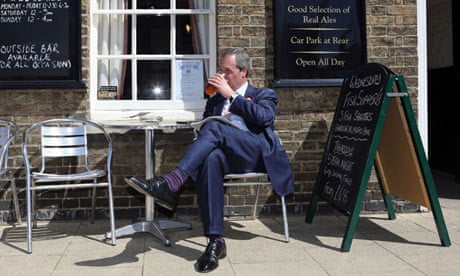Britain's political establishment is bracing itself to see if Thursday will herald the dawn of four-party politics in England, as Ukip leader Nigel Farage hopes to achieve a level of support in the county council elections sufficient to demonstrate that his brand of nationalism is now embedded in the electoral landscape.
With only six of the 27 English county councils and eight unitary authorities declaring overnight, David Cameron is preparing for the loss of as many as 500 seats – and the start of a two-year campaign to the next general election in which he will try to quell the apparent surge in support for Ukip.
Cameron's coalition partners, the Liberal Democrats, were privately predicting they were going to trail fourth behind Ukip in share of the vote, and indicating they did not expect to see their vote recover in next year's European elections either.
Labour, expecting to hold the South Shields parliamentary seat in Thursday's byelection caused by the resignation of former foreign secretary David Miliband, also acknowledged that Ukip appeared poised to move into second place for a second byelection in a row. Both the Tory and Liberal Democrat votes looked to have collapsed to Ukip.
However, Ukip's spread-out support means it is expected to win not much more than 50 council seats – while Labour has said it will not win more than 250 when all the election results are declared on Friday. Overall, the Liberal Democrats are expecting to lose 130 or so, but acknowledge that predictions are hazardous due to the uncertainty of whether Ukip can coax its burgeoning support to the ballot box without a recognised national infrastructure.
Fresh polling and academic evidence suggests Ukip appears to be benefiting from becoming, in effect, the voice of English nationalism. According to the research, it appears to be able to tap not just into dislike of the European Union, but also unease about the current political settlement in the United Kingdom.
A new survey shows that, between 2011 and 2013, the numbers identifying Ukip as the party best placed to stand up for England have risen from nine points to 21 points. It is now seen the best of all the large parties to represent the English interest, according to data derived from a Future of England survey conducted jointly by the IPPR thinktank, and Cardiff and Edinburgh universities.
In the 2011 and 2012 survey the most popular choice was that "no party" stood up for English interests, but Ukip – in second overall – has now become the best party to represent England. Even voters who backed the Tories in 2010 see Ukip as being as good as their own party in standing up for English interests: 34% of them picked Ukip, as opposed to 38% choosing the party they voted for at the general election.
The Conservatives' fear is that they will be squeezed in Friday's results by a resurgent Labour across the north and the Midlands, and by Ukip in the south and south-west. Cameron has tried to protect himself from questions about his leadership with a revamp of the Downing Street policy unit and the promise of tough measures to restrict the benefits of EU migrants in the Queen's speech.
Of the 2,362 council seats voted on on Thursday, 1,477 are in Tory hands. Boris Johnson, the Conservative mayor of London, said: "It's going to be a tough fight for my party in mid-term: that is inevitable." The Lib Dems were not expecting to win back control of Somerset, despite holding four of the five parliamentary seats in the county.
Labour, while admitting its campaign had stumbled, is focusing on what it hopes will be good results in some of its traditional heartlands. It is also wanting to do well in parts of Kent, Essex and Hertfordshire, where it needs to pick up seats at the general election to make a reality of Ed Miliband's One Nation theme.
The only council election being held outside England was in Anglesey, north Wales.
Overall, the Future of England survey, led by Guy Lodge of the IPPR, shows a slight fall in 2012 from 2010 among those regarding themselves as primarily English, possibly due to the British patriotism displayed during the Olympics. Nevertheless, 35% regard themselves as either exclusively English or primarily English, reflecting a long-term trend away from Britishness as the primary identity of English people. Twice as many in 2012 say they are more English than British, as opposed to more British than English.
The study also shows that 64% of those who regard themselves as more English than British believe UK membership of the EU is a bad thing. The authors say there is also a strong link between hostility to the European Union and to the current settlement with Scotland.
The authors conclude: "Ukip in the eyes of the electorate is fast emerging as the party that stands up for English interests. Ukip threatens to steal a march on the Tories in this fertile political territory."
Noting that "Ukip has achieved this position without so far explicitly playing the English card," the authors observe the damage to the Tories could be "more severe" if Farage were to focus on that area. They also claim Labour cannot afford to ignore Englishness, saying "it is in danger of being left behind on an agenda that is growing more important by the day".

Comments (…)
Sign in or create your Guardian account to join the discussion